#The Enchanted Life by Sharon Blackie
Explore tagged Tumblr posts
Text
November Reads
Seven books finished this month, again including the next book from my chronological order Discworld series re-read. If I had to recommend only one of the seven it would – hands down – be Nicola Chester’s On Gallows Down, which made me laugh and cry and left me uplifted and feeling that it is possible for each of us to make a difference in this world, even now. Reiterating (as always) that…

View On WordPress
#book recommedations#book reviews#Equal Rites by Terry Pratchett#On Gallows Down by Nicola Chester#Pandora&039;s Jar by Natalie Haynes#Shakespeare: The Man who Pays the Rent by Judi Dench#The Enchanted Life by Sharon Blackie#The Wood for the Trees by Richard Fortey#Wild Once by Vivianne Crowley
1 note
·
View note
Text
* * * * *
"Ultimately, to live an enchanted life is to pick up the pieces of our bruised and battered psyches, and to offer them the nourishment they long for. It is to be challenged, to be awakened, to be gripped and shaken to the core by the extraordinary which lies at the heart of the ordinary. Above all, to live an enchanted life is to fall in love with the world all over again. This is an active choice, a leap of faith which is necessary not just for our own sakes, but for the sake of the wide, wild Earth in whose being and becoming we are so profoundly and beautifully entangled."
- Sharon Blackie The Enchanted Life, Unlocking the Magic of the Everyday beyond the fields we know
Thanks to Whisky River
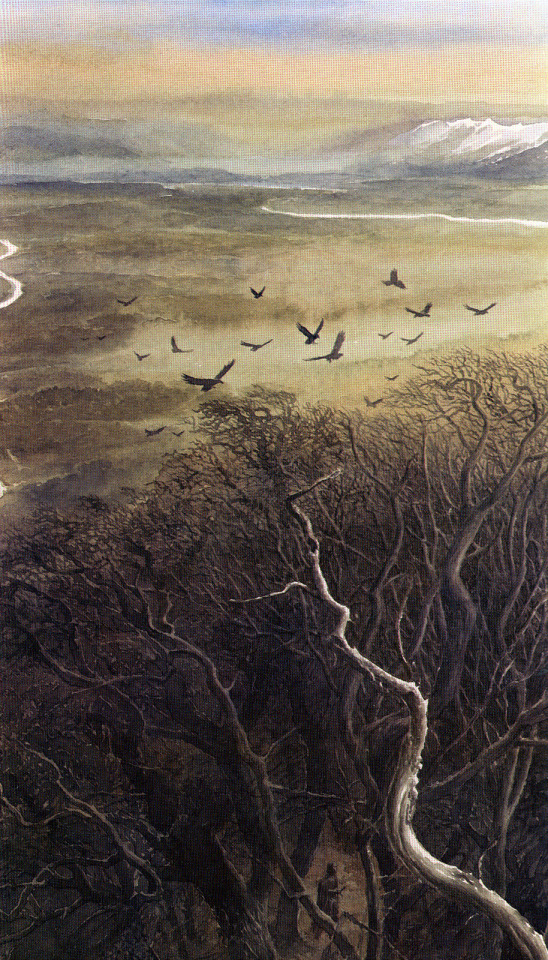
The Coming of Túrin to Brethil by Alan Lee
413 notes
·
View notes
Text
What I've Been Reading Lately
This post contains Amazon affiliate links. If you click through and make a purchase, I will receive a small compensation at no extra cost to you. This helps keep my blog ad-free. Here’s a very short list of three books I finished reading in the past week. Enjoy! No Mud, No Lotus: The Art of Transforming Suffering by Thich Nhat Hanh is one of the late teacher’s most-read books. When I was in my…

View On WordPress
0 notes
Text

‘You want to know what beauty is, boy? Look again at Old Crane Woman. Listen to Old Crane Woman’s cracked, croaking song. Beauty is a body bowed from the weight of a life fully lived. Beauty is hair bleached in the light of a life fully loved. Beauty is the angular, bony edges of a life fully risked. Look into Old Crane Woman’s cavernous black eyes: you’ll learn a thing or two about beauty. Listen to Old Crane Woman’s song: you’ll learn a thing or two about beauty. Listen to Old Crane Woman laugh in the long, cold dark. Listen to her weep in the fragile light of dawn. Listen to her joy in the pain of giving birth. Are you learning now about beauty?
You think she cares what you think? You think she cares, Old Crane Woman? Old Crane Woman is hatching an egg. She’s the watcher in the dark, the keeper of the tales. She’s the guardian of the gate, the crystal in the cave. Old Crane Woman was here before you and she’ll be here after you.
You pay your respects.’
From #theenchantedlife by #sharonblackie
1 note
·
View note
Text
List of books I’ve mentioned or reviewed on my blog
Here is the master list of books I’ve mentioned, with links to their pages. I will be keeping this list current and linked in my description.
*The ankh symbol [ ☥ ] indicates that this book is especially important to me and/or drastically changed my life
Secular/Science-Based/Skeptic-Friendly:
☥ Atheopaganism: An Earth-Honoring Path Rooted in Science by Mark Green
Braiding Sweetgrass by Robin Wall Kimmerer
☥ Drawing Down the Moon by Margot Adler
☥ DIY Magic by Anthony Alvarado
How to Become a Witch by Julie Wilder
☥ Psychic Witch: A Metaphysical Guide to Meditation, Magick & Manifestation by Mat Auryn
Storytelling Alchemy by Renée Damoiselle
The Beginner Witch’s Guide to Grimoires by Julie Wilder
The Door to Witchcraft by Tonya A. Brown
The Enchanted Life: Unlocking the Magic of the Everyday by Sharon Blackie
The Witch of the Forest’s Guide to Natural Magick by Lindsay Squire
The Witch’s Guide to Manifestation by Mystic Dylan
☥ Witchcraft Therapy by Mandi Em
Wisdom, Psychology, Philosophy, Self-Growth, etc…
☥ The Four Agreements by Don Miguel Ruiz
Non-Secular:
☥ Sane Occultism by Dion Fortune
Simply Wicca: A Beginner’s Guide to the Craft of the Wise by Lisa & Anton Stewart
☥ Wicca for Beginners by Thea Sabin
#book reviews#books#bookblr#wicca#pagan#paganism#neopaganism#witchcraft#secular witchcraft#witches#witch#witch vibes#justwitchythings#goodreads#litblr#reading#pagan reading list
124 notes
·
View notes
Text
Works that Aren’t About Witchcraft that Enhanced My Practice
What’s on this list? This list features anything that I found useful to my practice that aren’t necessarily about witchcraft, magick, etc. This includes works and resources regarding ecology and conservation, mental/cognitive health, slow living/lifestyle, anti-consumerism or minimal consumption, and spirituality that isn’t specific to witchcraft. These things have very much intersected with my practice, as I think a healthy land and a healthy mind lend themselves well to my craft.
I intend to update this list as I recall or stumble across things that I find useful to my practice.
Books:
Braiding Sweetgrass by Robin Wall Kimmerer: At this point, Kimmerer is a mandatory read. In Braiding Sweetgrass, she shares her story of connecting to the land via her work and experience with plants.
Bringing Nature Home by Douglas W. Tallamy: A detailed examination about how we can all make a difference by planting native plants, even if it’s just in a planter on our balcony. This is largely U.S. focused but I’m sure other places can benefit from information on how indigenous plants impact their ecosystem. It’s a fascinating, informative, and very positive read.
The Sustainable(ish) Living Guide by Jen Gale: A lot of the info in this is very UK-focused. I’m not in the UK but found the information widely relevant nonetheless, though some of the resources did not apply to me (but I found some similar resources in my areas with a search).
The Nature Fix by Florence Williams: An investigation into how imperative nature, and being in nature, is for our mental and cognitive health.
Exploring the World of Lucid Dreaming by Stephen LaBerge, Ph.D. and Howard Rheingold: If you’re a witch, you may already lucid dream. But, either way, learning more about it is worth it. You’re bound to learn something new.
The Re-Enchantment of Everyday Life by Thomas Moore: A VERY good read. Thomas Moore details all the ways that we can look at life through an enchanted lens. Even with the little areas of life that we take for granted.
Scarcity Brain by Michael Easter: An informative and helpful examination of how everything is designed to steal your attention, and how to help yourself unplug and resist the cravings and bad habits that your brain is so addicted to.
The Enchanted Life by Sharon Blackie: A lovely work on how to enchant your life, and why it matters.
Meditation for Fidgety Skeptics by Dan Harris: An incredibly practical and grounded guide to mindfulness and meditation that strips meditation of its horrible marketing and lays bare the essentials.
Coyote America by Dan Flores: A weird choice for my weird list. This is a wonderful book about coyotes, their history, their folklore and myths, and their magnificent resilience. It has helped me better understand my landscape by helping me understand one of its most prominent creatures: The Coyote.
The Little Book of Hygge by Meik Wiking: Another obligatory read! This book is quite popular, for good reason. It provides insight into the Danish phenomenon of “Hygge” which, perhaps, has been a little over-used and perhaps even appropriated. However, there are great insights into how you can create memorable and convivial moments.
Why We Sleep by Matthew Walker, Ph.D.: Fixing your sleep can absolutely aid in your practice!
Never Home Alone by Rob Dunn: As an animistic witch, I believe that everything is, in a manner of speaking, “alive.” This book covers a much similar truth… the fact that you share your home with other living creatures. Your house is alive, with everything from bugs to bacteria, and this book explains why that is probably a good thing.
The Hero with a Thousand Faces by Joseph Campbell: Mythologist Joseph Campbell is a necessary (if flawed) read for anyone interested in the topic of mythology. In spite of the flaws of his works and studies, they still remain a great source of food for thought.
The Head Trip by Jeff Warren: An intriguing and humorous look into consciousness and it’s altered states…
Natural by Alan Levinovitz: A book breaking down how the marketing term “natural” doesn’t necessarily mean good or safe.
A Life Less Throwaway by Tara Button: Another great look at practical sustainable living.
Resources:
The Old Farmers’ Almanac: The classic almanac! They have bountiful online resources, such as weather forecasts, solar/lunar forecasts, planting/gardening guides, and more. They still sell physical copies of the almanac every year. I get a copy by subscription and review it to help me anticipate and observe the wheel of the year. The books have a lot of (hilarious) ads, though.
Meditation apps or recordings: There are so many out there right now and some of them might not be great, but it’s ultimately a great resource for developing meditation skills through guided meditation. Understandably, not everyone has the means to buy meditation app subscriptions. Double check to see if your healthcare covers the costs of any apps, if your library does, or if your place of work does. Alternatively, there are lots of free meditation recordings out there on every audio streaming service and YouTube.
The National Audubon Society: I use their field guides often in my hiking. They have ample resources for birding, conservation, and more. Consider getting involved in your local chapter! Please also read this important article from J. Drew Lanham.
Home Grown National Park is a movement that encourages you to plant native! The site is a U.S.-based resource that will help you identify, find, and plant native plants in your own yard, and encourages people to create a native landscape that helps our pollinators!
MY LOCAL LIBRARY! Especially their online resources. Look at YOUR libraries!
Refill Directory and Litterless have lists of refill/package-free stores by state.
A Drugs Interaction Checker that I utilize to double check any new herbs I’m trying just to ensure they don’t have any KNOWN interactions with my meds. PLEASE READ: This is not the end all be all to consuming ANYTHING safely. Please consult your doctor(s) before consuming anything new or unfamiliar.
ATU-Index that you can actually look through!
Merlin Bird ID is a great resource for identifying birds from bird song!
Stargazing apps and star charts! There are too many to choose from.
Content Creators:
Naphtali Rosenberg is a great source of ideas and guidance regarding journaling and information consumption. I’ve actually used some of his videos for help with my grimoire.
Science Vs. Podcast is unfortunately a Spotify exclusive, but they do deep dives into popular trends and ideas and holds them up to the light of science. I firmly believe that it is imperative that we, as witches, learn media literacy and hold science as a primary vehicle of truth.
Pathways with Joseph Campbell is a podcast where every episode is just one of Campbell’s lectures. Unfortunately, most of his lectures were free and available on demand, but the Joseph Campbell Foundation has since been charging money to buy the lectures (and it’s stupid expensive). This podcast, however, is free.
Bernadette Banner is a historical fashion YouTuber. Sounds irrelevant to this post, but she has inspired me to really reevaluate my relationship with fashion by making thoughtful choices and avoid the overconsumption that can be so tempting. Anything that grounds me and my lifestyle is intangible to my practice.
Caitlin Doughty or Ask a Mortician is a great and informative YouTuber that really helped me address death in a humorous and informative way.
4 notes
·
View notes
Text
okay so I started reading Sharon Blackie's The Enchanted Life at the suggestion of my therapist and even tho I cited a lot of her research in my college work I never actually read any of her books and I got things to say idk this introduction is very easy going i think this was written for people with absolutely no understanding of colonialism/capitalism
maybe i should skip the intro and see how much it levels up
2 notes
·
View notes
Photo

https://www.bookdepository.com/Enchanted-Life-Sharon-Blackie/9781912836444?ref=pd_detail_1_sims_b_p2p_1
1 note
·
View note
Text
Yay!
Last song: let me down slowly - Alec benjamin -- for whatever reason the other day, I was reminded that this song existed, found it on Spotify, and then listened to it on loop for two hours straight.
Currently watching: mom's been rewatching mentalist and I've been watching whatever eps are playing when I'm home and conscious; currently season five and everything is so complex and dire!
Currently reading: almost done with rooted, and loving it so much; recently started a modern celt and it's too soon to have an opinion so far:


Current obsession: I'm like four weeks into a twelve week thing on reconnecting with nature, and I'm letting it take me wherever it leads. Next up is and enchanted life by Sharon blackie. Have done several Google dives on shamanism related topics and keep getting annoyed by all the racism and appropriation (need to find other words to search, I think). I'm waiting for fall leaves the way the cats wait for their breakfast in the morning. I'm pining for the fjords (well, for the sea and the mountains, NC doesn't have them together).
Also journaling. Always. Crystals. Always. I'm planning a trip to the grocery store to see how many plants I can grow from there over winter (including star fruit, funnily enough!). I'm craving sushi enough that it's taking up a large part of my brain. I'm thinking about trees a lot (just found out the one by work is a bald cypress (associated with mourning, sacred to Hades) and the one by the river is eastern hemlock (poisonous)).
Tagging: all A' y'all! Play along if you want!
Tagged by @threefill thank youu!
Tag 9 people you’d like to get to know better.
Last song: Blinding Lights - The Weekend
Currently watching: the Watcher guys put out a new season of Ghost Files and I’m nothing if not a sucker for funny spooky stuff I can consume without triggering my brain weasels
Currently reading: Uhhh
I just got a job as a school librarian (more or less) and I found this stuffed in an old filing cabinet in my office
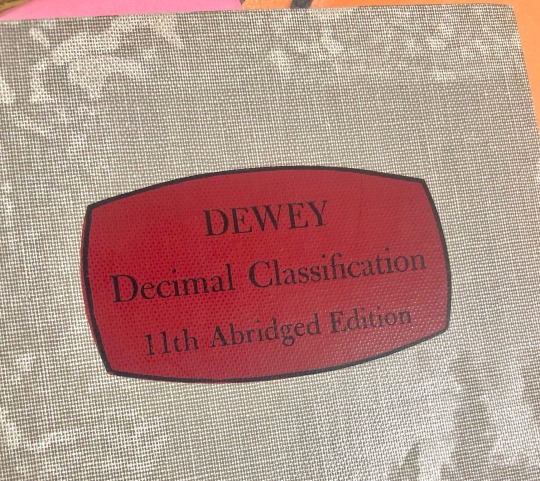
exciting stuff I know.
Also, this morning I was reading Library Lion by Michelle Knudsen because I’m going to structure a class around it, and out of nowhere had to go lock myself in the bathroom because I thought I was going to start bawling because I HAVE WANTED TO DO THIS FOR SO LONG YOU HAVE NO IDEA.
Current obsession: uhm… Sandman. Yeah, still, and for the long-foreseeable future. But also, see above about the new job. It is Consuming Me because getting thrown headfirst into it is Terrifying.
And starfruit trees. I am determined to have one. We got fruit from three different sources (fancy schmancy organic grocery store, ye olde regular grocery store, and the back yard of some lady we know) and I have eight different labeled pots in different locations and we’re waiting to see which seeds are viable. I’m guessing Team Lady’s Back Yard will win.
Tagging @61below @xxsneepsnoppxx @ghostboyjules @kianga @hannibalatemyheart @ye-olde-norrington-stan @pellaaearien @emfyre @samiholloway
6 notes
·
View notes
Text
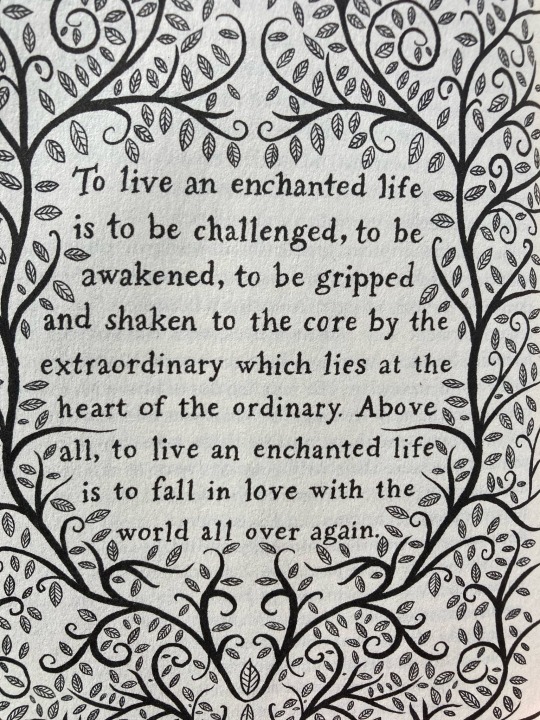

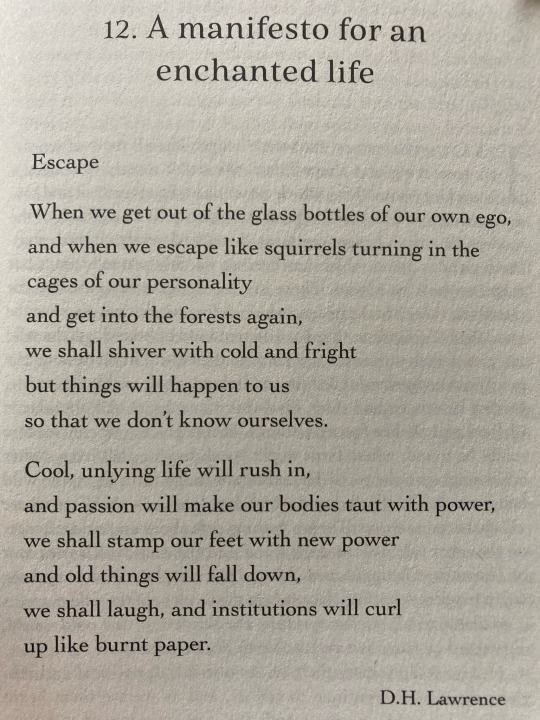
The Enchanted Life, Reclaiming the Magic and Wisdom of the Natural World, by Sharon Blackie
#just finished#books#reading#bookworm#Sharon blackie#enchanted life#nature core#d.h. lawrence#poetry
12 notes
·
View notes
Quote
To live an enchanted life is to pick up the pieces of our bruised and battered psyches, and to offer them the nourishment they long for. It is to be challenged, to be awakened, to be gripped and shaken to the core by the extraordinary which lies at the heart of the ordinary. Above all, to live an enchanted life is to fall in love with the world all over again.
Sharon Blackie
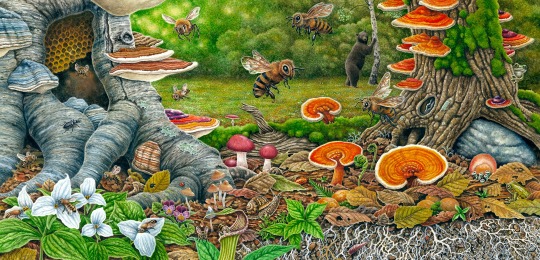
39 notes
·
View notes
Text
But we also use the word 'hedge' to indicate a quite different kind of boundary: the wild margins which surround the cultivated fields. Think now of the gnarly old hedgerows of Britain and Ireland: thick, richly flowering, berried hawthorn and elder, blackthorn and hazel. An abundance of food and shelter for wild things. Secret places, where treasure might be found, where birds might speak to you and foxes shelter while singing to the stars. The suburban hedge walls us in; the wild hedge marks the edge beyond which freedom lies - the place where village becomes forest. There's nothing safe about an ancient hedge: on the other side lies the dark wood and the road which goes ever on. An ancient hedge is an enchanted place; a place where anything might happen. A liminal place, where the wisdom of the wild margins is available to all. Hedge wisdom: the wisdom of the wild world, unfettered by rules and impossible to institutionalise.
—Sharon Blackie, The Enchanted Life
53 notes
·
View notes
Text
“Urban Ecology and Animism in the Landscape of the Great Lakes”: An interview on decay, restoration, bioregionalism, and “ecological citizenship” in the Midwest
From 26 December 2018, Belt Magazine. Excerpts:
Authors Matt Stansberry and Gavin Van Horn recently published books on the urban wildlife of the Great Lakes region (Rust Belt Arcana: Tarot and Natural History in the Exurban Wilds by Belt Publishing, and The Way of the Coyote: Shared Journeys in the Urban Wilds by University of Chicago Press, respectively). In this wide-ranging conversation, Stansberry and Van Horn discuss the overlaps in each other’s books and the progress, challenges, and joys of living with and writing about nature in the industrial Midwest.
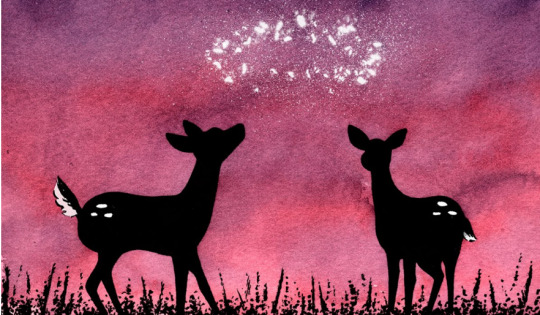

GVH: Some of the book is about holding on to what remains, trying to live in a way that allows others to live (such as when you write about box turtles or salamanders). But there are also expressions of hope in the book, particularly when it comes to meeting people who are hard at work on restoration projects. I’m thinking here of the Cleveland Museum of Natural History’s work at Mentor Marsh, and also the lessons you glean from Tim Jasinski of Lights Out Cleveland. Could you tell us a little bit about those projects? And perhaps the strides you see in the Rust Belt to respond with care to the land and water, which you call “holy work”?
MS: Those two chapters show different approaches to dealing with our impacts on wildlife. The first chapter you reference, “Temperance,” explores the effort needed to restore one of Lake Erie’s largest wetlands back into a functioning ecosystem. It’s inspiring because of how daunting the task must have seemed—to try to remove hundreds of acres of nearly impervious invasive reeds. After years of sustained, systematic effort and investment, we are seeing a return of biodiversity to this site.
-
GVH: You end with “The World” card and reflections on what E.O. Wilson has called the “Age of Loneliness” (the Eremozoic Era). After detailing the historic superabundance of biological life in Ohio, you say, “I want to leave you with the impression that our home has a potential to be one of the wildest, most fecund places on the planet… I tell you these things to repeat the names, so that you know that they are there. …There is still plenty of time to roll in the dirt in a forest. Stare out at Lake Erie. Listen to the wind. Don’t live separately from the world. Don’t despair.” What kinds of practices would you recommend for connecting to the magic of the everyday?
MS: So you mention a bunch of good ideas right there. Roll in the dirt. Stare at the lake. Since finishing the book, I’ve read The Enchanted Life by Sharon Blackie, and it’s full of so many brilliant ideas that I’ve been trying, ways to make myself more grounded in the place where I live. We can learn the myths of our home regions, draw big maps of the places we live and hike, plant gardens with native species, craft objects and food out of the plants around us, name the species of birds, start re-enchanting the landscape.
I see a lot of overlaps in our work as well. For example, both of our books center around the study of urban wildlife, animals in the city. You write: “When the city presses in upon me, coyotes remind me of the vitality that weaves its way between the buildings. Humans may often disregard, displace, and disrupt other kinds of animal life, but the anima of what we now call Chicago is not gone. The coyotes keep it flowing; they keep going along, beckoning us toward greater fidelity with our non-human kin. Lead on coyotes. Show what a city can be.”
Engaging with urban wildlife is not something you expected to be doing, and not something historically that has been of interest to the science/naturalist community. What do you learn from studying city creatures that you don’t learn in more rural or wild environments?
GVH: A city constitutes one portion of a landscape continuum. Occasionally in the book, I venture outside of city limits, acknowledging that many species don’t do well in smaller patches of habitat and with human presence (hell, I don’t do well with continual human presence). Yet my focus is on “ordinary” and close-to-home creatures as amazing expressions of life, worthy of our fascination and attention. Familiarity need not breed contempt. Familiarity can be a portal into our most intimate and meaningful relationships. Several essays feature ecologists and biologists who are turning back toward the city with curiosity and scientific rigor, seeking to counter the story of urban nature as less-than-worthy. I suppose I’m doing something similar with my writing.
MS: In one of my favorite essays, “De los pajaritos del monte” you marvel at your friend’s lifelong connection—physical, familial, cultural—to a landscape. You’ve moved around the country, the same way I have, and seem to struggle with that rootlessness. I think we both envy what your friend has with his home landscape. Can you write your way into place? Is even one lifetime enough to get rooted?
GVH: One lifetime, so far as I know, is all we’ve got, so I hope that’s enough to actualize one’s ecological citizenship. As you know, this book was part of my own process of adapting to life in an urban area. Writing is a way to further deepen the bonds of memory, to invite others (and perhaps yourself) to see the world from a fresh perspective. It’s an alchemical process—to transform experience into ink, and then for readers to permit those words to conjure new worlds in their imaginations. And the hope is that those stories, then, shape how a person moves through the landscape and the way they value it.
But the question of roots is one that haunts me a bit, in all honesty. I’m a person that has lived in many places. Some of us are more nomadic in spirit; some landscapes make our hearts sing more than others. What if a person feels displaced—like a plant outside of the microbiome to which it is most suited—and no amount of spiritual equanimity or sheer amount of time spent in a place can create a sense of at-homeness? (...)
MS: You have a chapter exploring Aldo Leopold’s concept of the numenon of the north woods, the ruffed grouse. You suggest Chicago’s numenon is the Night Heron? What’s a numenon and what’s a night heron?
GVH: As one young man who does ecological restoration work on the South Side of the city told me, “It’s a getting better Chicago.” He’s right. A lot of Midwestern cities, like Chicago, are in what is sometimes called a post-industrial phase. (...) [But] the recovery is tangible ...
-
Read more.
40 notes
·
View notes
Photo

“But there’s the interesting thing: what if, searching for new stories to live by, we actually looked back at those old stories again – the fairy tales we loved as children and the myths which entrance us still as adults? What if we could find some clues there – in the stories which tell us that we are a part of this living, breathing world around us? The stories which taught and inspired us for millennia – the stories which, today, are largely dismissed as primitive, and regulated to the domain of children…" - Sharon Blackie
2 notes
·
View notes
Text
“The exterior landscape interacts with our interior landscape, and in the resulting entanglements, we become something more than we otherwise could ever hope to be. We take on and begin to express something of its mysterious, earthy qualities…to welcome those entanglements, to become in them and through them something both greater and infinitely more interesting than a single, isolated human life–is to be enchanted.”
- Sharon Blackie, The Enchanted Life
#nature#pagan#witchcraft#witch#paganism#neopaganism#just witchy things#litblr#book blr#quotes#literature#reading#book worm#bookworms unite#women writers#philosophy#spirituality#books
11 notes
·
View notes
Text
It is to be challenged, to be awakened, to be gripped and shaken to the core
Ultimately, to live an enchanted life is to pick up the pieces of our bruised and battered psyches, and to offer them the nourishment they long for. It is to be challenged, to be awakened, to be gripped and shaken to the core by the extraordinary which lies at the heart of the ordinary. Above all, to live an enchanted life is to fall in love with the world all over again. This is an active choice, a leap of faith which is necessary not just for our own sakes, but for the sake of the wide, wild Earth in whose being and becoming we are so profoundly and beautifully entangled.
- Sharon Blackie, The Enchanted Life, Unlocking the Magic of the Everyday (September Publishing, February 27, 2018)
12 notes
·
View notes